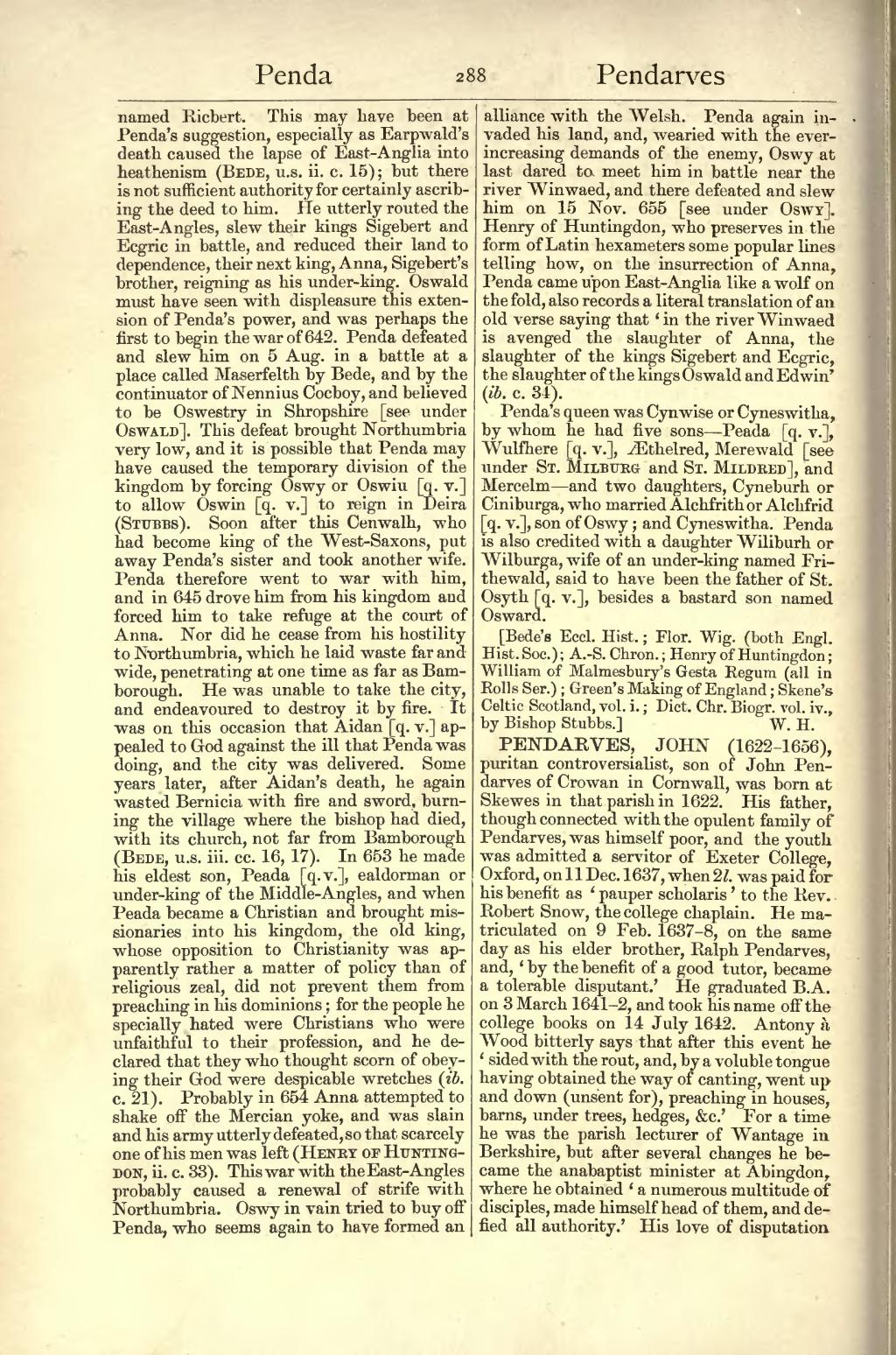named Ricbert. This may have been at Penda's suggestion, especially as Earpwald's death caused the lapse of East-Anglia into heathenism (Bede, u.s. ii. c. 15); but there is not sufficient authority for certainly ascribing the deed to him. He utterly routed the East-Saxons, slew their kings Sigebert and Ecgric in battle, and reduced their land to dependence, their next king, Anna, Sigebert's brother, reigning as his under-king. Oswald must have seen with displeasure this extension of Penda's power, and was perhaps the first to begin the war of 642. Penda defeated and slew him on 5 Aug. in a battle at a place called Maserfelth by Bede, and by the continuator of Nennius Cocboy, and believed to be Oswestry in Shropshire [see under Oswald]. This defeat brought Northumbria very low, and it is possible that Penda may have caused the temporary division of the kingdom by forcing Oswy or Oswiu [q. v.] to allow Oswin [q. v.] to reign in Deira (Stubbs). Soon after this Cenwalh, who had become king of the West-Saxons, put away Penda's sister and took another wife. Penda therefore went to war with him, and in 645 drove him from his kingdom and forced him to take refuge at the court of Anna. Nor did he cease from his hostility to Northumbria, which he laid waste far and wide, penetrating at one time as far as Bamborough. He was unable to take the city, and endeavoured to destroy it by fire. It was on this occasion that Aidan [q. v.] appealed to God against the ill that Penda was doing, and the city was delivered. Some years later, after Aidan's death, he again wasted Bernicia with fire and sword, burning the village where the bishop had died, with its church, not far from Bamborough (Bede, u.s. iii. cc. 16, 17). In 653 he made his eldest son, Peada [q. v.], ealdorman or under-king of the Middle-Angles, and when Peada became a Christian and brought missionaries into his kingdom, the old king, whose opposition to Christianity was apparently rather a matter of policy than of religious zeal, did not prevent them from preaching in his dominions; for the people he specially hated were Christians who were unfaithful to their profession, and he declared that they who thought scorn of obeying their God were despicable wretches (ib. c. 21). Probably in 654 Anna attempted to shake off the Mercian yoke, and was slain and his army utterly defeated, so that scarcely one of his men was left (Henry of Huntingdon, ii. c. 33). This war with the East-Angles probably caused a renewal of strife with Northumbria. Oswy in vain tried to buy off Penda, who seems again to have formed an alliance with the Welsh. Penda again invaded his land, and, wearied with the ever-increasing demands of the enemy, Oswy at last dared to meet him in battle near the river Winwaed, and there defeated and slew him on 15 Nov. 655 [see under Oswy]. Henry of Huntingdon, who preserves in the form of Latin hexameters some popular lines telling how, on the insurrection of Anna, Penda came upon East-Anglia like a wolf on the fold, also records a literal translation of an old verse saying that ‘in the river Winwaed is avenged the slaughter of Anna, the slaughter of the kings Sigebert and Ecgric, the slaughter of the kings Oswald and Edwin’ (ib. c. 34).
Penda's queen was Cynwise or Cyneswitha, by whom he had five sons—Peada [q. v.], Wulfhere [q. v.], Æthelred, Merewald [see under St. Milburg and St. Mildred], and Mercelm—and two daughters, Cyneburh or Ciniburga, who married Alchfrith or Alchfrid [q. v.], son of Oswy; and Cyneswitha. Penda is also credited with a daughter Wiliburh or Wilburga, wife of an under-king named Frithewald, said to have been the father of St. Osyth [q. v.], besides a bastard son named Osward.
[Bede's Eccl. Hist.; Flor. Wig. (both Engl. Hist. Soc.); A.-S. Chron.; Henry of Huntingdon; William of Malmesbury's Gesta Regum (all in Rolls Ser.); Green's Making of England; Skene's Celtic Scotland, vol. i.; Dict. Chr. Biogr. vol. iv., by Bishop Stubbs.]
PENDARVES, JOHN (1622–1656), puritan controversialist, son of John Pendarves of Crowan in Cornwall, was born at Skewes in that parish in 1622. His father, though connected with the opulent family of Pendarves, was himself poor, and the youth was admitted a servitor of Exeter College, Oxford, on 11 Dec. 1637, when 2l. was paid for his benefit as ‘pauper scholaris’ to the Rev. Robert Snow, the college chaplain. He matriculated on 9 Feb. 1637–8, on the same day as his elder brother, Ralph Pendarves, and, ‘by the benefit of a good tutor, became a tolerable disputant.’ He graduated B.A. on 3 March 1641–2, and took his name off the college books on 14 July 1642. Antony à Wood bitterly says that after this event he ‘sided with the rout, and, by a voluble tongue having obtained the way of canting, went up and down (unsent for), preaching in houses, barns, under trees, hedges, &c.’ For a time he was the parish lecturer of Wantage in Berkshire, but after several changes he became the anabaptist minister at Abingdon, where he obtained ‘a numerous multitude of disciples, made himself head of them, and defied all authority.’ His love of disputation
